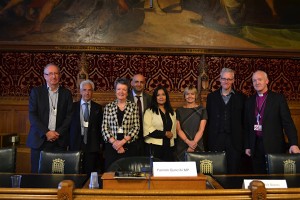All party parliamentary group on religious literacy in the media
In early May, an All Party Parliamentary Group on Religious Literacy in the Media was launched at Westminster with a round-table discussion moderated by the Sandford St Martin Trust Chair, the Rt Rev Nick Baines, Lord Bishop of Leeds. Among those also participating in the event was Iftikhar Khan one of the founders, a CTO and futurist at Alchemiya Media. What follows is his report for MuslimView and was first published on their website.

WEDNESDAY, MAY 11TH, 2016
Yasmin Qureshi MP for Bolton South East launched the All Party Parliamentary Group on Religion in the Media with a round table session held at the Palace of Westminster on Wednesday 4th May 2016.
The stated aims of the APPG are to work for greater religious literacy in the media and political spheres, to foster a better understanding and representation of religion in coverage of news and culture, recognizing the priority of religion as a prime motivator for individuals and communities in the country. The APPG aims to encourage more diversity in media representation of religion. Also, under the public service broadcasting remit of the BBC and Channel 4, it will advocate the inclusion of a commitment to promote religious literacy.
Lord Baines (the Bishop of Leeds, and Chair of the Sandford St Martin’s Trust) very ably and engagingly moderated a panel discussion between several high profile speakers. Aaqil Ahmed, the Head of BBC Religion and Ethics spoke of the changing demographics within certain parts of the UK that, tied to underrepresentation and a lack of media understanding have led to troublesome coverage, for example the Trojan Horse issue in schools in Birmingham. An ignorance of the nature of more conservative views as in this instance will only lead to more entrenchment of withdrawal and isolation from society, rather than fostering understanding. Aaqil estimated that there is a 5-10 year window of opportunity to ameliorate this before the issue becomes of greater concern with the current status quo of mutual suspicions is unacceptable.
Roger Bolton, the former BBC Editor and Presenter (‘Sunday’ on Radio 4) noted that the default stance and credo in most mainstream journalism in the UK is of liberal secularism. He also provided figures showing that the budget for religious programming on ITV declined from £40M to £2M in the five years to 2013, and likewise from £40M to £20M on Channel 4; Channel 4 no longer has a Commissioning Editor for Religion.
Academic Dr Abby Day, the Research Director of the Religion Media Centre at Goldsmiths College opined that every newsroom should have at least one religion expert, and that a core element of all media studies courses should cover religion. There should be exchanges between religious media outlets and the mainstream media. Dr Day gave the regretful example of the Sun ‘newspaper’ carrying out a scientifically unrigorous survey that led to the front page headlines of ‘1 in 5 Muslims support terrorism’ and the subsequent tiny apology buried and hidden deep within the paper after censure by IPSO.
Dr Jenny Taylor of Lapido Media gained her doctorate studying the sociology of religion and in particular the migration of Muslims. She declared that the world is full of religion and that the religiously unaffiliated in the world population will decline from 16% to a projected 13% by 2050. Misrepresentation and bias in the western media does not reflect the way that religion shapes allegiances in the rest of the world. Dr Taylor also quoted Bernard Levin who observed that in the British language, “vicars” rhymes with “knickers” and that this (unconscious) word association leads to ambivalence in attitudes to organized religion in this country.
Sir Alan Moses, the Chairman of IPSO, and a lively orator, regretted the “unattended ignorant depiction of what communities in this country believe”, and that while the BBC and Channel 4 have a statutory obligation of public service broadcasting, the policies and regulation of the press is determined by a set of standards set by the editors themselves, and that this may not always coincide with the public interest. He also stated that he wished there was much more “intelligent and compassionate” discussion of faith in the media.
Finally, the historian and author Tom Holland mused that the broad consensus in the media reflects the automatic assumption that ignorance about religion is a source of pride. This narrow viewpoint ignores the fact that religion is a vast spectrum of opinion. Holland also noted that secularism is not religiously neutral, but is rather a Christian concept, mediated through Christian theologians and Popes, and hence we refer specifically to a separation of Church and State rather than as a general synecdochical term.
There followed a brief and spirited question and answer session from the floor, including opinions from various journalists and broadcast professionals and from Baroness Elizabeth Berridge and Martin Vickers MP who both sit on related committees, and Baron Idarjit Singh of Wimbledon (and regular contributor to Radio 4’s Thought for the Day) decrying the lack of representation on the panel of anyone from the non-Abrahamic faiths. Yasmin Qureishi MP did counter this point by pointing out that this was not by design, and that as a kick-off meeting, there was limited time in this session, and that in future there would be fairer representation to those of all major faiths.
It is to be hoped that the APPG builds on the objectives and aims declared in this inaugural session with the same unified approach to foster better representation and understanding of religious life within society through more accurate representation, and wider coverage.
Both MuslimView and Alchemiya welcome and are supportive of these developments as this is also one of the aims of both organisations to be a source and a resource for religious literacy concerning Islam and Muslims in political circles as well as in the media.


